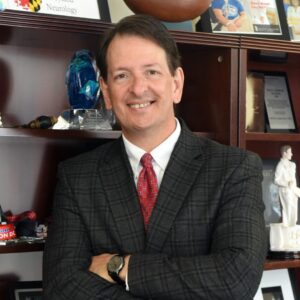
The TSC Alliance draws physicians, researchers, industry partners, and the TSC community into the research process, and thus they are uniquely positioned to help drastically alter the course of this disease. Grant funding from the TSC Alliance was pivotal early in my career to launch my laboratory research. Their commitment to early career researchers over the years has galvanized a group of basic and clinical researchers dedicated to finding a cure for TSC.”
Peter Crino, MD, PhD, Professor and Chair, Department of Neurology, University of Maryland School of Medicine
We ensure researchers have the data and funds they need to discover breakthroughs in TSC.
As part of that commitment, we support innovative ideas, preclinical testing and clinical research to ensure a robust pipeline of drug discovery, and ultimately, a cure for TSC.
The TSC community is our strongest ally.
Our research priorities reflect the most pressing needs of those affected by this disease and their families, including TSC-associated neuropsychiatric disorders (TAND), epilepsy and tumors.
Learn about the priorities of our community as reflected in our 2023 constituent survey: MORE →
Read more about how the TSC Alliance developed its research strategy to meet the most pressing needs of the TSC community here.
The TSC community not only drives our priorities, but they are also active and irreplaceable participants in our research through the Biosample Repository, Natural History Database and clinical trials. They also make their voices heard by reviewing grant applications, serving on steering committees, sharing their lived experiences to influence policy, and advocating for increased TSC research funding.
Together we are accelerating the development of new treatments.
Our research platforms serve as catalysts along multiple points of the drug discovery pipeline.
Additionally, we are dedicated to improving the quality of care received by those with TSC with input from medical professionals and the TSC community. As part of this effort the TSC Alliance recently launched two initiatives to address specific health challenges:
TSC Alliance investigators collaborate, share discoveries and learn from each other to push research forward.
Advancing research requires dedicated investigators, individuals with TSC, government and industry. We foster collaboration between all stakeholders through:
- Biannual international research conferences that bring together top TSC researchers and focus on structured, collaborative discussions on groundbreaking research topics
- Innovative workshops that discuss brand new hypotheses and explore novel ideas for research
- Close coordination with various funders, including the Tuberous Sclerosis Complex Research Program (TSCRP) at the Department of Defense, the National Institutes of Health (NIH), and others, to ensure our joint efforts are complementary, not duplicative
- Insights from leading TSC experts around the world who serve on our International Scientific Advisory Board
- Partnerships with other TSC advocacy organizations to support the availability of genotype and phenotype data in a TSC1 and TSC2 Variation Database
We’re making a difference.
Since 1984, the TSC Alliance has invested more than $37 million in research. This initial investment serves as a launching point, driving additional investment from the TSCRP, the NIH, and others, multiplying the impact of our funding.
Furthermore, our research efforts and collaborations with a wide range of partners have resulted in six FDA approved treatments in the United States available for some aspects of the disease or related conditions.
Finally, since TSC is a linchpin disease, meaning its genetic pathway also plays a role in other diseases and disorders, advancements in TSC research have enhanced treatments for autism, epilepsy, and cancer—diseases that affect nearly 27 million people in the US alone.
There is still more work to do, but together we are changing the course of this disease.
Be part of the next breakthrough in TSC research.
Are you interested in learning more about our research efforts and finding out how you can get involved? Contact Steve Roberds, PhD, Chief Scientific Officer at the TSC Alliance at sroberds@tscalliance.org.
